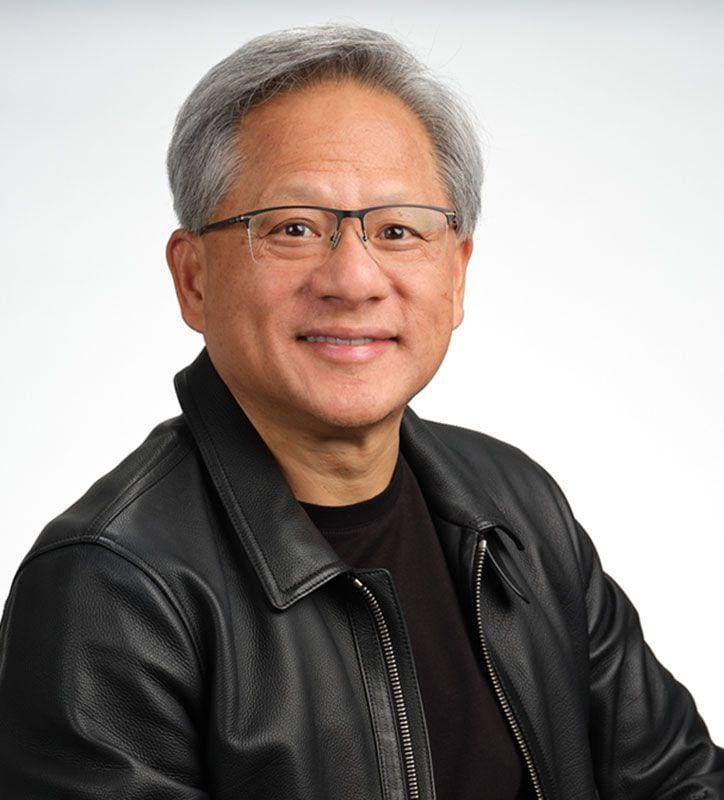
NVIDIA CEO Jensen Huang recently concluded a high-profile tour spanning Washington, D.C., and China, advocating for the transformative potential and strategic importance of artificial intelligence. This trip, encompassing both key global markets, highlights the company’s commitment to shaping the conversation around AI development and deployment. This article will examine Huang’s key messages delivered in both locations, analyzing the implications of his visits for NVIDIA, AI technology, and the evolving geopolitical landscape. We will delve into the specific topics discussed and the stakeholders engaged, offering insights into NVIDIA’s vision for the future of AI and its role in driving innovation worldwide.
Table of Contents
- NVIDIA CEO Advocates for AI Innovation and Collaboration in US Capital
- Huang’s Recommendations for Strategic AI Deployment and Workforce Development
- Balancing Technological Advancement and Geopolitical Considerations in China
- Practical Pathways for Responsible AI Global Integration and Regulatory Frameworks
- Q&A
- The Way Forward

NVIDIA CEO Advocates for AI Innovation and Collaboration in US Capital
Jensen Huang, CEO of NVIDIA, recently made headlines not only for his advocacy for artificial intelligence innovation within the United States but also for his concurrent efforts to foster collaboration on AI technologies with China. His visits to Washington, D.C., involved discussions with policymakers regarding the strategic importance of maintaining US leadership in AI. Huang emphasized the need for increased investment in AI research and development, talent acquisition, and infrastructure to ensure the nation’s competitive edge. His message resonated with many, particularly concerning the geopolitical implications of falling behind in this pivotal technological race.
Simultaneously, Huang’s engagement with China signals a complex approach to global AI development. While details of his discussions in China remain somewhat less transparent, the move underscores the understanding that AI’s transformative potential necessitates international dialog. Key areas highlighted during his time in Washington, D.C., include:
- Infrastructure Investment: Advocating for government support in building robust AI infrastructure.
- Talent Development: Highlighting the necessity of attracting and retaining skilled AI professionals.
- Ethical Considerations: Emphasizing the importance of responsible AI development.
| Location | Focus Area |
|---|---|
| Washington, D.C. | US AI Leadership |
| China | International Collaboration |

Huang’s Recommendations for Strategic AI Deployment and Workforce Development
Jensen Huang’s recent visits to Washington, DC, and China underscored NVIDIA’s commitment to fostering strategic AI deployment while simultaneously addressing critical workforce development challenges. His engagements highlighted the need for thoughtful policy-making and investment in education to ensure responsible AI adoption across industries. Central to his message was the idea that AI should augment human capabilities, empowering workers to tackle more complex tasks and boosting overall productivity.
Huang emphasized specific strategies:
- Public-Private Partnerships: Encouraging collaboration between government, industry, and educational institutions to develop comprehensive AI training programs.
- Lifelong Learning Initiatives: Advocating for continuous education programs that equip workers with the skills needed to adapt to the changing demands of the AI-driven economy.
- Ethical AI Frameworks: Promoting the development and implementation of ethical guidelines to ensure fairness, transparency, and accountability in AI systems.
| Pillar | Strategy |
|---|---|
| Education | Upskilling programs |
| Policy | Ethical guidelines |
| Investment | R&D funding |

Balancing Technological Advancement and Geopolitical Considerations in China
Jensen Huang’s recent visits to both Washington, DC, and China highlight the delicate balancing act NVIDIA, and many other tech companies, must perform. While advocating for AI’s transformative potential, Huang navigates the complex geopolitical landscape, specifically U.S.-China relations. In Washington, the focus is often on reassuring policymakers about responsible AI development and mitigating potential national security risks. His messages likely emphasize collaboration and ensuring a competitive advantage for the U.S. in the AI race. Conversely, in China, his efforts center on solidifying NVIDIA’s market presence and demonstrating commitment to the Chinese market, all while adhering to evolving regulations. The challenge lies in maintaining innovation speed globally while respecting the unique demands and perspectives of each nation.
NVIDIA’s situation embodies a larger trend of multinational tech companies needing to navigate different regulatory approaches and strategic priorities. Consider the following aspects of these parallel advocacies:
- Market Access: Maintaining a foothold in crucial markets hinges on compliance and relationship building.
- Technological Leadership: Balancing innovation with national security concerns is paramount.
- Supply Chain Resilience: Diversification and strategic partnerships become critical in volatile times.
| Region | Key Message | Potential Outcome |
|---|---|---|
| Washington, DC | AI for US Competitiveness | Policy support, funding |
| China | Commitment to Chinese Market | Market share retention |

Practical Pathways for Responsible AI Global Integration and Regulatory Frameworks
Jensen Huang’s recent visits to Washington, D.C. and China underscore the growing importance of navigating the complex landscape of AI integration on a global scale. His engagements highlight the dual imperative of fostering innovation while addressing critical regulatory considerations. These discussions could shape future policies and partnerships, promoting safe and ethical AI development globally. Key areas of focus likely include:
- Ensuring responsible AI development: Prioritizing safety, fairness, and transparency in AI systems.
- Promoting cross-border collaboration: Facilitating dialogue and knowledge sharing between nations.
- Addressing ethical concerns: Establishing guidelines for AI applications in various sectors.
The potential impact of Huang’s advocacy can be further understood by examining the diverse approaches to AI regulation worldwide. The following table provides a brief comparative analysis of regulatory focuses in key regions:
| Region | Regulatory Focus |
|---|---|
| United States | Innovation and Sector Specific Guidelines |
| European Union | Comprehensive AI Act, Risk Management |
| China | Data Security and Algorithmic Governance |
Q&A
Q&A: NVIDIA CEO Jensen Huang’s Recent AI Advocacy in DC and China
This Q&A explores the significance of NVIDIA CEO Jensen Huang’s recent engagement with policymakers and industry leaders in both Washington, D.C., and China, highlighting his message on the critical role of AI in global innovation.
Q: What were the key themes of Jensen Huang’s message during his visits to Washington, D.C. and China?
A: Across both locations, Huang emphasized the transformative potential of artificial intelligence and the crucial role NVIDIA plays in enabling its development. He stressed the importance of fostering innovation in AI to drive economic growth, improve societal well-being, and maintain global competitiveness. Specifically, his messaging touched upon:
AI as a General-Purpose Technology: He positioned AI as a fundamental technology, akin to electricity or the internet, driving innovation across various sectors.
The Need for Collaboration: He advocated for open dialogue and collaboration between governments, industry, and academia to responsibly harness AI’s benefits.
Data Sovereignty and Security: Huang acknowledged concerns surrounding data security and advocated for policies that balance innovation with data protection.
Importance of Infrastructure: He highlighted the critical need for robust AI infrastructure, including advanced computing platforms and skilled talent, to support widespread adoption.
Q: How were Jensen Huang’s messages received in Washington, D.C.?
A: In Washington, D.C., Huang engaged with lawmakers and government officials, likely focusing on issues such as:
AI Regulation: Discussions likely centered on ongoing debates about AI regulation, including potential guardrails for emerging technologies like generative AI.
Competitiveness and National Security: He likely emphasized the importance of maintaining U.S. leadership in AI, linking it to economic competitiveness and national security interests.
Research and Development Funding: Huang probably advocated for increased funding for AI research and development, particularly in areas like chip manufacturing and AI infrastructure.
The reception was generally positive, with policymakers recognizing the strategic importance of AI and the role NVIDIA plays in its advancement. However, discussions likely also addressed concerns regarding the potential risks associated with AI, such as job displacement and algorithmic bias.
Q: What specific topics did Jensen Huang likely address during his engagements in China?
A: Considering the current geopolitical climate, Huang’s discussions in China likely revolved around:
Supply Chain Resilience: He likely addressed the importance of diversifying and securing supply chains for critical components, acknowledging the impact of export controls on NVIDIA and the broader industry.
AI Development in China: Discussions undoubtedly covered China’s own advancements in AI and the opportunities for collaboration in areas like research and development.
Local Innovation: Huang probably emphasized NVIDIA’s commitment to supporting local innovation and fostering a thriving AI ecosystem within China.
Q: What is the significance of Huang’s engagement with both Washington, D.C. and China?
A: Huang’s engagement highlights the global and interconnected nature of the AI landscape. It signals the importance of:
Diplomacy in Technology: It demonstrates the growing role of technology leaders as informal diplomats, bridging gaps between nations to foster innovation and address shared challenges.
Navigating Geopolitical Tensions: It underscores the complex task of navigating geopolitical tensions while maintaining global leadership in critical technologies like AI.
Promoting Responsible AI Development: By engaging with policymakers in both regions, Huang promotes a global dialogue on responsible AI development, ensuring its benefits are shared widely and its risks are mitigated.
Q: What are some potential takeaways from these interactions for the future of AI?
A: Key takeaways include:
Increased Scrutiny and Regulation: Expect increased scrutiny and potentially more structured regulation of AI technologies, particularly regarding data privacy, security, and ethical considerations.
Greater Emphasis on Collaboration: There will likely be a greater emphasis on international collaboration to address global challenges related to AI, such as climate change and pandemic preparedness.
Focus on AI Infrastructure: Investments in AI infrastructure, including high-performance computing, data centers, and specialized hardware, will continue to be a priority for both governments and private sector companies.
* Talent Development: Efforts to cultivate a skilled AI workforce through education, training, and reskilling initiatives will become increasingly crucial to ensure that societies can fully leverage the potential of AI.
The Way Forward
In conclusion, Jensen Huang’s recent trips to Washington, DC and China underscore the increasing global recognition and importance of artificial intelligence. NVIDIA’s efforts to engage with policymakers and industry leaders in both regions highlight the need for international collaboration and understanding in navigating the development and deployment of AI technologies. As AI continues to evolve and impact various sectors, these discussions will be crucial in shaping its responsible and beneficial integration into our global society. The future of AI hinges not only on technological advancements but also on carefully considered regulatory frameworks and cross-border partnerships.

